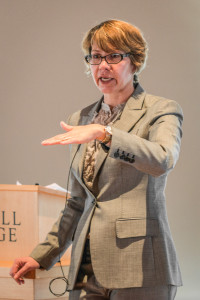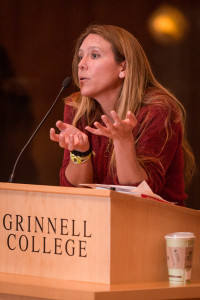Under the sponsorship of the College’s Rosenfield Program in Public Affairs, International Relations and Human Rights, a symposium titled “Chicago: Urban Issues and Social Justice in the Windy City” took place this week. The symposium, which began on Tuesday, Feb. 3 and runs through today, featured speakers from all over the country, who touched on topics ranging from grassroots activism to deindustrialization.
The final event is a panel discussion to be held tonight at 7 p.m. in JRC 101, titled “Images and Issues in Urban Education,” featuring panelists from Chicago-area schools. It is sponsored by the Careers in Education Professions program, along with “The Education Project Photo Exhibition.”

Photo by Chris Lee
Tuesday’s first event was canceled due to travel complications, but the evening event titled, “Mayor 1% and Shaping the New Chicago: The Reign of Rahm Emanuel, the 2015 Election and Beyond,” featured Kari Lydersen, a Chicago journalist and author, and enjoyed a good turnout. Much of her talk focused on Emanuel’s approach to running the city. She explained that he has focused on streamlining and not wasting any money, like a neoliberal corporation, often calling his approach “trimming the fat.” Lydersen argued that although he has a good track record in terms of climate protection policies regarding the Great Lakes, these might be superficial policy changes meant to make him look good. She also discussed several public crises that occurred in Chicago, including a teachers’ strike in 2011 and the shutting down of the city’s public health clinics in 2012.
Wednesday’s first event featured Associate Professor Virginia Parks of the School of Social Service Administration at the University of Chicago and was titled, “The Fight for Economic Justice from the Streets of Chicago.” Parks spoke on the economic disparities in the greater United States and Chicago in particular. She specifically focused in part on the worth of the minimum wage and how fast food, gas station and other minimum wage job employees in Chicago have been striking for $15 an hour. Parks also touched on the way that race affects employment rates and consequently incomes, highlighting the difference between economic disparity and wealth/income disparity and how it is “sharply defined by race and ethnicity.”
Wednesday’s second event featured two recent alums, Christian Snow ’13, the current Director of Community Engagement at Street-Level Youth Media, and Javon Garcia ’14, who works in health outreach through HIV Services at The Night Ministry. They spoke about their individual experiences working as activists in Chicago.
“I wear many hats,” Snow said. “I’m a fixer, a big planner and a very detail-oriented person.”
Both Snow and Garcia discussed the multifaceted jobs where they currently work, stating that working for a nonprofit organization requires a lot of flexibility and patience.
“Sometimes in activism you don’t see results immediately,” Garcia said.

Photo by Chris Lee.
Snow and Garcia focused, both in their introductions and the in the talk back, about a “wrong way” of doing activism. Garcia cautioned against pity-driven volunteers, arguing that people should give back without putting themselves above the people they are helping. Snow focused on what she called “transplant activists,” saying that people from Grinnell and other liberal arts colleges need to be careful of “colonizing Chicago.”
“They [people who move to Chicago] don’t come into the city and start learning, they just come in and start fighting. That’s not good enough,” Snow said. “It takes a transition period of shutting up.”
Thursday included two events, one in Burling Library basement titled “The Education Photo Project,” which was a gallery tour and talk by artist Sandra Steinbrecher. The gallery features photographs of Chicago high schools facing challenges. The exhibit will be available through March 15. The second event on Thursday was titled, “Politics from Below: Grassroots Struggles Reshaping the Landscape of Chicago,” and was presented by Barbara Ransby, a professor of history at the University of Illinois at Chicago.
























































